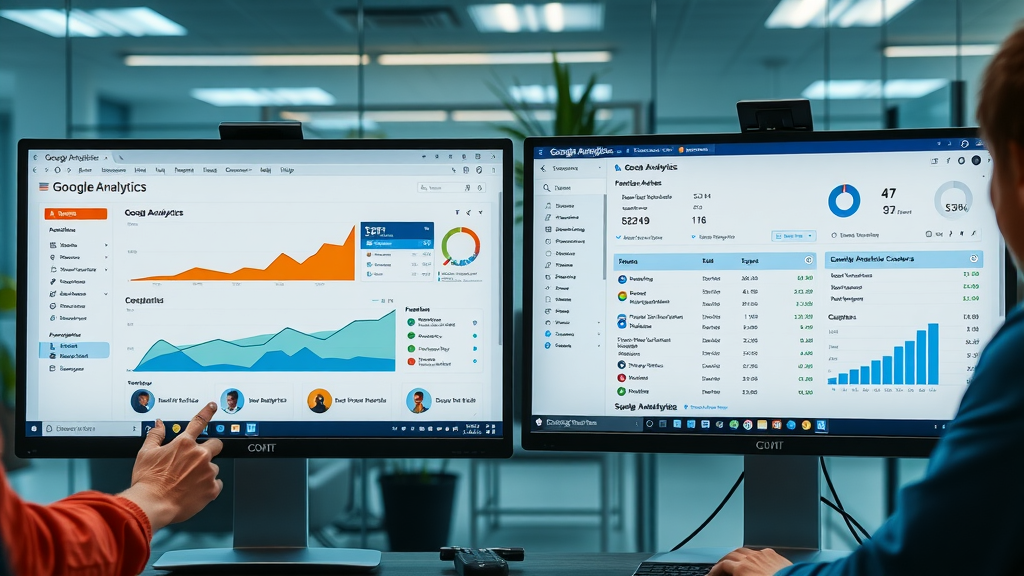Did you know that 53% of website traffic originates from organic search, yet more than 70% of businesses aren’t leveraging SEO analytics effectively ? If you’re relying only on basic web analytics or flying blind when it comes to search rankings, you’re leaving serious results—and revenue—on the table. This comprehensive guide reveals the pro-level SEO analytics hacks the best brands use to dominate search engine results, boost organic traffic, and turn data into growth. Ready to upgrade your SEO performance and outpace your competition? Let’s dive in!
Unlocking SEO Analytics: The Hidden Truth Behind Every Ranking
- Did you know 53% of website traffic comes from organic search — yet over 70% of businesses don’t use SEO analytics effectively? Learn how SEO analytics can offer deeper insights into your traffic and conversions than traditional analytics tools.

- Explore how utilizing SEO analytics unlocks strategies top companies use to stay ahead of Google algorithm updates.
Harnessing the power of SEO analytics is more than just tracking clicks and impressions—it's about understanding the raw data that reveals how your SEO efforts influence your site’s visibility in search engine results. Unlike traditional analytics tools, which provide surface-level user behavior and traffic, specialized SEO tools dive deep into how your keywords rank, which pages convert, and what technical factors may be holding your business back. By using an advanced seo analytics tool , you gain unique insight into the factors impacting your keyword ranks, organic traffic, and backlink profile—with actionable guidance to improve every metric.
The most successful businesses don’t react to monthly dips in traffic—they proactively analyze and act on SEO reports to refine their strategies, execute ranking-boosting changes, and consistently outperform competitors. Whether you’re optimizing blog content, running a technical SEO audit , or following up on monthly keyword ranking shifts, having the right analytics tools and well-structured SEO reporting is what separates digital leaders from digital laggards.
SEO Analytics Breakdown: Master the Metrics That Matter Most
What You’ll Learn on Your SEO Analytics Journey
- How SEO analytics tools help you see what your competitors can't.
- The difference between basic analytics tools and advanced SEO analytics.
- How to use Google Analytics and Google Search Console for actionable SEO insights.
- Proven SEO analytics hacks for rapid improvements in organic traffic and conversions.
- Step-by-step workflows for supercharged SEO reporting.
To excel at SEO, you need to understand which SEO metrics truly matter—and how SEO analysis transforms these numbers into strategic insight. Advanced analytics tools grant you access to granular data about keyword rankings, CTR, bounce rates, page speed, technical SEO issues, and more, helping you build a holistic picture of your SEO performance. Taking this further, specialized SEO analytics tool like SEMrush, Ahrefs, or Moz let you monitor SERP position shifts, conduct comprehensive competitor research, and perform audit-driven troubleshooting to maximize every link and page on your site.
As your skills grow, you’ll learn how to distinguish between “nice-to-have” vanity metrics and the KPIs directly impacting your search engine success—organic traffic, keyword position, search intent alignment, and technical SEO health. By mastering these seo analytics hacks , you’ll stay agile and prepared, continually outpacing Google algorithm changes while driving measurable improvements to your rankings and business KPIs.
Why SEO Analytics Must Be Your First Growth Tool
From SEO Audit to Execution: Connecting the Dots
- Understanding SEO analytics vs. traditional analytics tools.
- How SEO reports reveal hidden growth levers others miss.
- Using an SEO analytics tool to bridge your strategy and execution.
Any effective SEO strategy starts and ends with data. While traditional analytics platforms like Google Analytics offer high-level overviews (think: sessions, bounce rate, conversions), SEO analytics tools provide targeted, action-oriented insight. This distinction is crucial for entrepreneurs and marketers who need to connect every SEO effort directly to ROI. When you run an SEO audit using dedicated analytics tools , you uncover growth levers your competitors overlook—such as on-page errors, thin content, crawling issues, and high-potential keyword gaps.
With these insights in hand, your journey from SEO audit to execution becomes a seamless feedback loop. You identify problems through reporting, implement solutions, and watch as your positions and organic traffic climb in the search engines. The result? Accelerated growth powered by a data-driven process, not guesswork—and a sustainable SEO advantage that compounds month after month.
Choosing the Right SEO Analytics Tool for Your Business
Google Analytics vs. Dedicated SEO Analytics Tools
- Key differences: what Google Analytics misses that SEO analytics covers.

- Why Google Search Console is essential for comprehensive SEO analytics.
Google Analytics shines at offering a broad snapshot of overall site performance—tracking user sessions, traffic sources, and conversions. However, it wasn’t built to track the nitty-gritty components that power SEO growth. That’s where specialized SEO analytics tools come in, providing SERP tracking, keyword research, technical audits, competitor analysis, and backlink tracking Google Analytics simply can’t match.
On the other hand, Google Search Console emerges as a critical complement—delivering direct insight from Google about your search queries, indexed pages, mobile usability, and crawling errors. Combining all three—Google Analytics, Google Search Console, and a dedicated SEO analytics tool —offers unparalleled visibility into your SEO performance, letting you pinpoint what’s working and what needs improvement with unmatched precision.
Feature Comparison Table: Top SEO Analytics Tools
| Tool | Starting Price (per month) | SERP Tracking | Technical Audits | SEO Reports | Integrations |
|---|---|---|---|---|---|
| SEMrush | $129.95 | Yes | Yes | Advanced | Google Analytics, Search Console, Data Studio |
| Ahrefs | $99 | Yes | Yes | Advanced | Google Analytics, Search Console |
| Moz Pro | $99 | Yes | Yes | Customizable | Google Analytics, Search Console |
| Google Analytics | Free | No | Limited | Basic | Google Ads, Google Data Studio |
Setting Up SEO Analytics: Your Step-by-Step Guide
SEO Audit: Laying the Foundation
- Conduct an initial SEO audit using your chosen analytics tool.
- Prioritize key SEO metrics — organic traffic, search rankings, backlink audits.

Every winning SEO campaign begins with a thorough SEO audit . This audit provides a snapshot of your site’s current health, identifying technical SEO weaknesses, keyword ranking gaps, and on-site optimization issues. Using an industry-leading audit tool (such as SEMrush or Ahrefs), break down the audit into core areas: organic traffic analysis, search engine crawlability, site speed, mobile optimization, and a robust backlink profile. Each report surfaces critical errors and opportunities, directly informing smarter seo strategy .
Once the audit is complete, prioritize high-impact SEO metrics like keyword rankings, organic sessions, and backlinks, while also cataloging technical SEO issues—duplicate content, broken internal links, slow-loading pages—that may throttle your growth potential. Addressing these audit findings first ensures that every future effort is built on a technically sound and high-performing website.
Integrate with Google Analytics and Google Search Console
- How to connect Google Analytics to your SEO tools for full-funnel insights.
- Linking Google Search Console: uncovering missed SEO opportunities.
Connecting your SEO analytics tool to Google Analytics and Google Search Console opens up a comprehensive view of both user behavior and search engine visibility. With this integration, you can blend data around bounce rates and conversions with metrics like search query impressions, average keyword rank , and technical crawling errors. The result is full-funnel visibility: you’ll see how SEO attracts and converts traffic—while instantly spotting leaks and untapped keyword opportunities hiding in your search console data.
If you haven't already, start by linking your Google Analytics account to your chosen seo tool using built-in integrations. Next, verify your site with Google Search Console and ensure its data feeds seamlessly into your reporting dashboards. This workflow empowers continuous optimization and lets you react instantly to algorithm updates or site issues, ensuring your seo performance stays ahead of the competition.
Automating SEO Reporting for Maximum Impact
- Set up automated SEO reports that surface changes in SEO performance instantly.
Time is money. Automating SEO reporting means you’re always on top of the latest wins, setbacks, and opportunities without ever logging into a dozen dashboards. Most modern SEO analytics tools support automated scheduling: you can receive daily, weekly, or monthly SEO reports packed with the KPIs that matter. Instantly spot traffic dips, ranking surges, or technical errors, giving your team a head start in resolving issues or doubling down on what’s working.
Integrate alerts from your favorite analytics tools with project management platforms or communication channels (like Slack or Asana), so you never miss a critical seo performance update. This automation allows for nimble decision-making—ensuring data isn’t siloed and actionable insights reach the right people at exactly the right moment.
SEO Analytics Hacks: Pro Tips for Every Marketer
Grow Organic Traffic with These Analytics Tools
- Reverse-engineer competitors’ wins with keyword gap analysis in your SEO analytics tool.
- Leverage search console data for ultra-quick SEO wins.

One of the most undervalued tactics in SEO is the ability to reverse-engineer your competitors’ success. Using a top-tier SEO analytics tool , you can analyze where competitors are ranking, discover their most valuable keywords, and identify gaps between your content and theirs. This empowers you to pursue low-hanging fruit—keywords with high search volume and low competition—and swiftly outpace rival brands in the search engine results.
Don’t overlook the power of Google Search Console data for immediate SEO wins. Regularly audit your list of indexed and non-indexed pages, flag technical errors, and filter queries that are ranking just off page one. Small tweaks to these opportunities—including meta description improvements and better internal linking—often yield disproportionately high jumps in organic traffic.
Data-Driven SEO Audit: Uncover Ranking Blockers Fast
- How to combine SEO reports and analytics tools to detect on-page and technical SEO issues.
- Spot on-site search engine errors using advanced filters.
A truly data-driven seo audit goes deeper than surface-level checks. By combining SEO reports from multiple analytics sources, marketers can quickly pinpoint critical ranking blockers—be it crawling issues, under-optimized meta tags, slow pages, or low-quality backlinks. Use advanced filters in your analytics and audit tool to hone in on specific search engine errors, measuring the impact of each fix on your keyword ranking and organic traffic over time.
These advanced tactics turn raw data into high-impact action. Set up dashboards that track technical SEO improvements month-over-month, and make regular health assessments part of your seo strategy . The result: faster recovery from drops, sustained ranking gains, and a fortified site structure resistant to future search engine algorithm changes.
Content Optimization through Advanced SEO Analytics
- Using SEO analytics to align your content with search intent and maximize rankings.
Optimizing content for search engines isn’t just about sprinkling in keywords—it's about aligning each piece of content with search intent. Advanced SEO analytics reveal which topics and questions are driving the most engagement, where your copy falls short, and what users expect to see. By regularly reviewing top-performing content and mapping your topics to search engine demand, you ensure every new article or landing page is laser-targeted to what your audience and Google crave.
These insights don’t just help you move up the rankings—they’re the key to driving qualified organic traffic, improving dwell time, and boosting conversions from each visit. Empower your editorial calendar with the data your competitors ignore, and you’ll cement your place as the go-to resource in your niche.
Real-World SEO Analytics Success Stories
"Within 3 months of tracking SEO analytics, we spotted a technical error that was blocking 40% of our pages from Google’s index. Fixing it boosted our traffic by 65%." — B2B SaaS CEO
"Switching to a purpose-built SEO analytics tool cut our reporting time in half and gave us pinpoint clarity on what actually impacts our sales." — Shopify Store Owner
Measuring SEO Performance: Interpreting the Data
Key SEO Metrics You Must Track
- Organic traffic, impressions, click-through rates (CTR), bounce rates, keyword rankings, backlink profiles, SEO ROI.
Measuring the right seo metrics is essential. Each tells a story: organic traffic shows audience growth, keyword rankings indicate search engine visibility, and metrics like impressions, CTR, and bounce rate highlight user engagement. Monitoring your backlink profile and SEO ROI helps you understand seo performance in context, confirming which links, pages, and campaigns drive real value. A robust tracking system using your preferred seo analytics tool ensures no critical trend or anomaly goes unnoticed.
How SEO Analytics Tools Visualize Your Growth
- Dashboards, trend lines, automated alerts, and historical data analysis.

Modern SEO analytics tools transform complex raw data into easy-to-read dashboards, animated trend lines, and actionable alerts. By visualizing year-over-year or month-over-month progress, you instantly spot which strategies fuel your rise in the search engine results. Automated alerts flag sudden ranking drops or traffic dips, so you can act fast—before a small issue turns into a business threat. Leverage these visual insights to drive executive reporting, team collaboration, and strategic decision-making centered on facts, not guesswork.
From Data to Action: Turning SEO Analytics Into Results
SEO Analysis in Action: Example Workflows
- Audit top landing pages for quick technical wins.
- Use analytics tools to spot declining pages and refresh content.
- Automate monthly SEO reports for easy client communication.
- Tie SEO performance metrics to actual business KPIs for executive reporting.

Ready to operationalize your newfound SEO analytics skills? Start with routine seo audits of your most valuable landing pages to identify low-effort, high-yield technical fixes. Use your analytics tools to monitor which pages are slipping in the search engine rankings, and prioritize these for content refreshes based on targeted keyword research . Don’t forget to automate monthly seo reports —not only does this free up time, it ensures every stakeholder (from clients to C-suite) has real-time performance insights.
Finally, integrate your seo metrics with business KPIs. Show how improvements in keyword ranking directly impact revenue, lead generation, and customer growth. When you tie SEO analysis to measurable business outcomes, buy-in and resources for SEO multiply—and your strategy becomes indispensable to your company’s growth story.
- Watch a concise explainer video demonstrating essential SEO analytics hacks anybody can start using today.
- Step-by-step video tutorial on setting up automated SEO analytics reporting workflows with your favorite analytics tool.
Frequently Asked Questions about SEO Analytics
What is SEO and analytics?
- SEO stands for Search Engine Optimization, and analytics refers to the measurement of website performance with data. SEO analytics combines these by using data-driven approaches to measure, track, and improve search engine performance.
What is the SEO analysis?
- SEO analysis is the process of evaluating a website’s visibility and health using SEO analytics tools to identify areas for improvement and strategies to enhance ranking and organic traffic.
What are the 4 types of SEO?
- The four main types of SEO are on-page SEO, off-page SEO, technical SEO, and local SEO. Each relies on accurate data from SEO analytics for optimization.
What does a SEO analyst do?
- A SEO analyst uses SEO analytics tools and techniques to monitor website performance, conduct audits, identify opportunities, and recommend strategies that improve rankings and grow organic traffic.
Checklist: Implementing Winning SEO Analytics Strategies
- Select the best SEO analytics tool for your needs.
- Connect with Google Analytics and Google Search Console.
- Set up key SEO metrics and reporting workflows.
- Review reports monthly and act on insights immediately.
Key Takeaways from the World of SEO Analytics
- SEO analytics is not optional—it's the foundation for sustained growth.
- Combining multiple analytics tools uncovers deeper, actionable insights.
- Data-driven strategies built on SEO analytics lead to higher rankings and more traffic.
Ready to Dominate with Smarter SEO Analytics?
- Ready to Become the Business Everyone’s Searching For? Stop losing leads to competitors who show up first and look better online. We help businesses just like yours dominate the digital landscape — with smarter SEO, high-converting websites, bulletproof reputation, engaging social media, and automated sales funnels that work 24/7. Let’s turn your online presence into your #1 sales engine. 👉 Book your free strategy calls today and get a personalized growth plan — no pressure, just value. 📞 Click here to schedule: Link Or call us directly: 408-903-0493
Take action today: Choose the right SEO analytics tool, connect your data, automate reporting, and start seeing results—fast.
To enhance your understanding of SEO analytics and implement effective strategies, consider exploring the following resources:
-
“How to Perform SEO Analytics: A 3-Step Guide to Success” : This guide offers a structured approach to SEO analytics, covering essential metrics like organic search traffic and backlinks, and provides practical steps to analyze and improve your website’s performance. ( semrush.com )
-
“SEO Analytics - Advanced Insights from Quattr SEO Experts” : This resource delves into advanced SEO analytics techniques, including the integration of Google Analytics (GA4) for comprehensive traffic analysis and the use of predictive analytics to forecast future performance, helping you stay ahead in the competitive digital landscape. ( quattr.com )
By leveraging these insights, you can develop a robust SEO strategy that drives measurable growth and keeps you ahead of the competition.
 Add Row
Add Row  Add
Add 




Write A Comment